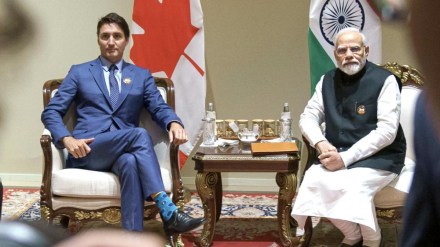India has expelled six Canadian diplomats in a significant escalation of the ongoing diplomatic conflict with Canada. The Ministry of External Affairs (MEA) late Monday evening confirmed the expulsion of diplomats, including Acting High Commissioner Stewart Ross Wheeler and Deputy High Commissioner Patrick Hebert, who have been given until 11:59 PM on October 19, 2024, to leave the country. This decision follows Canada’s recent expulsion of six Indian diplomats, including High Commissioner Sanjay Kumar Verma, as tensions mount between the two nations.
In its official statement, the MEA described Canada’s actions as “unjustified” and damaging to the relationship between the two countries. The Canadian diplomats ordered to leave include senior officials stationed in India, including: First Secretaries Marie Catherine Joly, Ian Ross David Trites, Adam James Chuipka, and Paula Orjuela.
The diplomatic fallout stems from allegations by Canada that India was involved in the 2023 assassination of Hardeep Singh Nijjar, a pro-Khalistan activist in British Columbia. Canadian Prime Minister Justin Trudeau claimed that there was “credible evidence” linking Indian agents to Nijjar’s killing, which India has vehemently denied. According to a report by The Washington Post, Canada’s investigation has uncovered extensive evidence linking multiple violent incidents in the country to the Indian government’s efforts to target Sikh activists.
India, however, has responded by accusing Canada of harboring pro-Khalistan extremists and allowing them to operate freely, posing a threat to India’s security. “India has repeatedly urged Canada to address the growing threats posed by Khalistani elements on its soil,” the MEA said in its statement. The Indian government insists that it had no involvement in the Nijjar incident and called the allegations politically motivated.
As tensions have continued to rise, The Washington Post revealed that Canadian authorities view Nijjar’s assassination as part of a broader pattern of violence targeting Sikh communities, allegedly orchestrated by the Modi administration. These claims have only deepened the distrust between the two countries, with India continuing to reject them.
The diplomatic standoff has led to concerns about potential impacts on trade and bilateral cooperation. While both nations express a desire to resolve the situation diplomatically, the expulsions of high-ranking diplomats reflect a hardening of positions on both sides. Moving forward, the challenge lies in managing these rising tensions without further damaging an already strained relationship, while addressing the security concerns at the heart of the dispute.
